|
Der
amerikanische Schriftsteller Gary Paulsen wurde
am 17. Mai 1939 in Minneapolis, Minnesota, geboren. Siehe auch mein Blog vom 17. Mai 2010 und auch mein Blog vom 17. Mai 2011.
Aus: Brian's Return
Brian sat quietly, taken by a peace he had
not known for a long time, and let the canoe drift forward along the lily pads.
To his right was the shoreline of a
small lake he had flown into an hour earlier. Around him was the lake itself,
an almost circular body of water of approximately eighty acres surrounded by northern forestpine, spruce, poplar
and birchand thick brush.
It was late springJune 3, to be exactand the lake was teeming, crawling,
buzzing and flying with life. Mosquitos and flies filled the air, swarming on him, and he smiled now,
remembering his first horror at the small blood drinkers. In the middle of the
canoe he had an old coffee can with
some kindling inside it, and a bit of birchbark, and he lit them and dropped a
handful of green poplar leaves on the tiny fire. Soon smoke billowed out and drifted back and forth
across the canoe and the insects left him. He had repellant with him this
timealong with nearly two hundred pounds
of other gearbut he hated the smell of it and found it didn't work as well as
a touch of smoke now and then. The blackflies and deerflies and horseflies ignored repellant completelyhe swore
they seemed to lick it offbut they hated the smoke and stayed well off
the canoe.
The relief gave him time to see the
rest of the activity on the lake. He remained still, watching, listening.
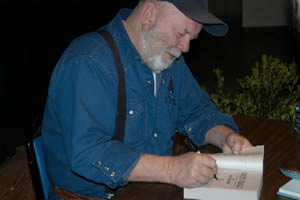
Gary Paulsen (Minneapolis, 17. Mai 1939)
Der
dänische Schriftsteller Peter Høeg
wurde am 17. Mai 1957 in Kopenhagen geboren. Siehe auch mein Blog vom 17. Mai 2009 und auch mein Blog vom 17. Mai 2010 und auch mein Blog vom 17. Mai 2011.
Aus: The Quiet Girl (Übersetzt
von Nadia
Christensen)
SheAlmighty had tuned each person in
a musical key, and Kasper could hear it. Best in the brief, unguarded moments
when people were nearby but didn't yet know he was listening. So he waited by
the window, as he was doing now.
It was cold. The way it could be only
in Denmark, and only in April. When, in mad enthusiasm for the spring light,
people turned off the central heating, brought their fur coats to the furrier,
dispensed with their long underwear, and went outside. And only when it was too
late, discovered that the temperature was at freezing, the relative humidity
90%, and the wind was from the north and went straight through clothing and skin,
deep into the body, where it wrapped itself around the heart and filled it with
Siberian sadness.
The rain was colder than snow, a
heavy, fine rain that fell like a gray silk curtain. From behind that curtain a
long black Volvo with tinted windows appeared. A man, a woman, and a child got
out of the car, and at first it looked promising.
The man was tall, broad-shouldered,
used to getting his own wayand capable of having a powerful impact on those
around him if he didn't. The woman was blond as a glacier and looked like a
million bucks; she also looked smart enough to have earned it herself. The
little girl had dignity and wore expensive clothes. It was like a tableau of a
holy, wealthy family.
They reached the center of the
courtyard, and Kasper got his first sense of their musical key. It was D-minor,
at its worst. As in Toccata and Fugue in D-Minor. Great fateful pillars of
music.
Then he recognized the little girl. At
that precise moment the silence occurred.
It was very brief, perhaps a second,
perhaps not at all. But while it lasted, it obliterated reality. It took away
the courtyard, the rehearsal ring, Daffy's office, the window. The bad weather,
the April month. Denmark. The present time.
Then it was over. Vanished, as if it
had never existed.
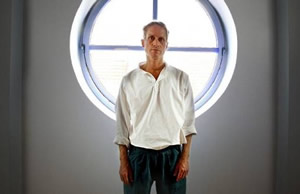
Peter
Høeg (Kopenhagen, 17. Mai 1957)
Der schwedische Lyriker und Schriftsteller Lars Gustafsson
wurde am 17. Mai 1936 in Västerås geboren. Siehe auch mein
Blog vom 17. Mai 2009 und auch mein Blog vom 17. Mai 2010 und auch mein Blog vom 17. Mai 2011.
Elegie auf einen
Labrador
Mitten im Sommer gibt es bei
uns Tage,
an denen es plötzlich Herbst
ist.
Die Krähen im Baum schlagen
schärfere Töne an.
Die Klippen ragen deutlicher
aus dem See als sonst.
Sie wissen etwas. Sie haben es
immer gewußt.
Wir auch, doch wollen wir
nichts davon wissen.
Auf dem Heimweg bist du oft am
Bug gestanden,
an solchen Abenden, hast den
Gerüchen nachgespürt,
die übers Wasser kamen, mit
ruhig gesammelten Blick,
den Abend entziffert, die
schwache Rauchfahne
eines Sommerhauses, den
Pfannkuchen, der irgendwo
drei Kilometer weiter briet,
einen Dachs bemerkt,
der ich weiß nicht wo in der
Dämmerung stand
und etwas witterte, ganz wie
du. Unsere Freundschaft
war natürlich ein Kompromiß:
wir lebten zusammen
in zwei verschiedenen Welten,
der meinigen
mit ihren Buchstaben, einem
lebenslänglichen Text,
und der deinen mit ihren
Gerüchen. Ich hätte viel
für deine Kenntnisse gegeben,
für dein Vermögen,
ein Gefühl wie Eifer, Haß oder
Liebe wie eine Welle
über den ganzen Körper
hinlaufen zu lassen
von der Nase bis zum Schwanz,
für deine Unfähigkeit,
dich damit abzufinden, daß der
Mond eine Tatsache ist.
Bei Vollmond hast du dich
lauthals darüber beklagt.
Als Gnostiker warst du mir
überlegen, und somit
hast du dauernd im Paradies
gelebt. Auch pflegtest du
Schmetterlinge aufzuschnappen
im Sprung und sie dann
hinunterzuschlucken. Abstoßend
fanden manche das.
Mir gefiel es. Warum habe ich
es dir darin
nie gleichtun können? Und dann
die Türen!
Waren sie zu, so legtest du
dich hin und schliefst ein;
irgend jemand würde sie
sicherlich öffnen,
früher oder später. Du hattest
recht. Ich hatte unrecht.
Heute, da diese lange, stumme
Freundschaft vorbei ist
für immer, frage ich mich, ob
auch ich am Ende
etwas konnte, was dir imponiert
hat. Ich meine nicht
deinen festen Glauben, daß ich
es war, der die Gewitter
hervorrief. Das war ein Wahn.
Ich denke eher,
mein sichres Gefühl dafür, daß
der Ball vorhanden war,
auch wenn er sich hinter dem
Sofa versteckt hielt,
hat dir eine Ahnung verschafft
von meiner Welt.
Fast alles in meiner Welt hält
sich versteckt
hinter etwas anderem. Ich
nannte dich Hund.
Ich frage mich ganz im Ernst:
Hast du mich wohl
für einen größern, lauteren
Hund gehalten,
oder für etwas anderes, etwas
für immer Unbekanntes,
das einfach ist, was es ist,
und existiert
auf seine Weise und damit
basta: den Pfiff
durch den nächtlichen Park, dem
zu folgen
man sich angewöhnt hat ohne so
recht zu wissen,
was das ist, dem man folgt. Und
ich
wußte ebensowenig von dir und
davon, was du warst.
Von diesem objektiveren
Standpunkt aus
waren wir zwei Organismen, zwei
jener Orte,
an denen das Universum sich in
sich selber
verknotet, verwickelt,
kurzlebige, komplexe Strukturen
aus Eiweiß, die sich immer
weiter verheddern müssen,
um zu überleben, bis das Ganze
versagt
und sich wieder vereinfacht,
der Knoten sich löst,
das Rätsel verschwindet. Du
warst eine Frage,
gerichtet an eine andere Frage,
sonst nichts,
und keine von beiden konnte der
andern Antwort geben.
Übersetzt von Hans Magnus
Enzensberger
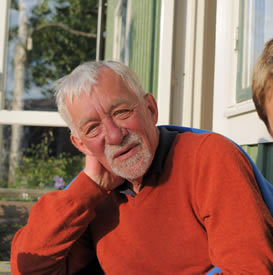
Lars
Gustafsson (Västeras, 17. Mai 1936)
Der
katalonische Dichter Jacint Verdaguer i Santaló
wurde am 17. Mai 1845 als Sohn eines sehr armen Steineklopfers in
Folgueroles geboren. Siehe auch mein Blog vom 17. Mai 2010
und auch mein Blog vom 17. Mai 2011.
Aus: Uit: LAtlàntida (Übersetzt von
Clara Sommer)
Und
eine Barke sieht er auf den Wellen
Durch
Klippen gleiten gleich dem weißen Schaum.
Und
Herkules verspricht, bei seiner Rückkehr
Die Stadt
zu gründen mit der Barke Namen,
Sie
groß zu machen wie die hohe Ceder.
Wer sie
erblickt, soll mit Erstaunen rufen:
Das ist
die Riesentochter des Alciden!
Um
ihretwillen fordert er den Dreizack
Vom
Meeresgott, von Jupiter den Blitz.
Des
Helden Bitte ward erhört vom Himmel:
O
schönes Barcelona, dein Gesetz
Bezwang
den Ozean in seiner Macht;
Aus
deinen Felsen zuckte Blitz auf Blitz
Zu
stolzem Siege auf den Kampfplatz nieder.
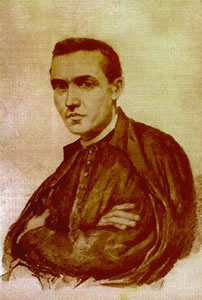
Jacint Verdaguer (17. Mai 1845 10. Juni 1902)
Die
englische Schriftstellerin und Essayistin Dorothy Miller Richardson wurde am 17.
Mai 1873 in Abingdon, Oxfordshire, geboren. Siehe auch mein Blog vom 17. Mai 2011.
Aus: Pointed Roofs
"Play 'Abide
with me,'" "Play 'Abide with me'" yesterday, if he didn't care?
What was the good of being so quiet and saying nothing? Why didn't he say
"Don't go" or "When are you coming back?" Eve said he
looked perfectly miserable.
There was nothing to
look forward to now but governessing and old age. Perhaps Miss Gilkes was
right. . . . Get rid of men and muddles and have things just ordinary and be
happy. "Make up your mind to be happy. You can be perfectly happy without anyone to think about. . .
." Wearing that large cameo brooch--long, white, flat-fingered hands and
that quiet little laugh. . . . The piano-organ had reached its last tune. In
the midst of the final flourish of notes the door flew open. Miriam got quickly
to her feet and felt for matches.
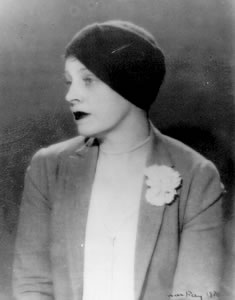
Dorothy Richardson (17. Mai 1873 - 17. Juni 1957)
17-05-2012 om 10:18
geschreven door Romenu 
Tags:Gary Paulsen, Peter Høeg, Lars Gustafsson, Jacint Verdaguer, Dorothy Richardson
|
